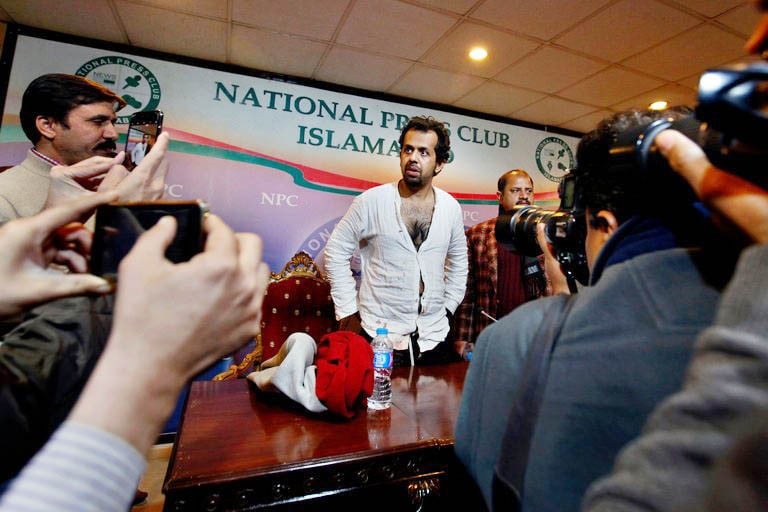
Taha Siddiqui talks about the ordeal of his attempted abduction

"What do you think of yourself? We will now tell you who are you," were the clearly uttered sentences of the alleged captors of Islamabad-based known journalist Taha Siddiqui who luckily managed to escape from the custody of nearly a dozen abductors in at least two different vehicles when he was on his way to the airport last Wednesday morning.
"I was off to London. On route to the airport, suddenly my car was forcibly stopped by some people who were chasing me. They directly came to me instead of the driver, alarming me that it was not something accidental but deliberate," a visibly shaken Siddiqui tells The News on Sunday. We met after he had joined a protest against his abduction attempt outside the National Press Club Islamabad on Thursday afternoon.
A handful of journalists and civil society members had gathered outside National Press Club on Thursday afternoon to protest the abduction attempt of a journalist who works for the foreign media.
"I started screaming and shouting when they put me in their car but they threatened me to shoot me in the leg if did not stop screaming," he says terming his escape not less than a miracle that day.
"I was in their car. Suddenly I saw the door of the car is unlocked. I quickly opened the door and jumped outside, managing a quick help by getting into a cab," he says. "Later, the cab driver said it seems some forces are following you and you will land me in trouble, so leave the cab immediately. I jumped out of the car and threw myself in an empty plot where I managed to hide in some bushes and later called my friends and reached the local police station."
The abductors took away his passport, phone and laptop with them, which he has mentioned in the police compliant and demanded the government to recover as soon as possible.
Siddiqui is a well-known journalist and a critic of the military establishment on his Twitter account. In 2014, he won the Albert Londres Prix French award. Siddiqui, 33, is Pakistan correspondent for the Paris-based France24 English language news television channel.
"Though I cannot confirm who is behind this abduction attempt, the way I was approached was similar to previous abductions and attempts of journalists, bloggers, social media activists and civil society members which are allegedly attributed to intelligence agencies," he asserts.
He was summoned last year by the civilian Federal Investigation Agency to answer for his Twitter posts that they considered "critical of the military". However, instead of meeting them, Siddiqui moved the court against this summoning.
"At that time my name was among the 30 persons’ list circulated in media who were being warned for their alleged maligning of the military on social media. Some of the names were from the ruling Pakistan Muslim League Nawaz social media activists too," he recalls. "My journalist friends were also getting message from certain corners that I was "crossing the line." I cannot say that I was doing what I was accused of but I do report on matters related to military and I do express my thoughts on different issues.
"I think it was an organised effort by certain elements," he says, adding this phenomenon of picking up journalists and civil society voices is growing in our society. "This is a deliberate effort to shrink the space and control voices. This is a serious ongoing attempt to curb freedom of expression and freedom of press. It is worrying that the space for non-state actors and militant groups is expanding by the day, and the space for liberal and progressive voices critical of state policies is reducing."
In another incident of this kind, last October, Ahmad Noorani, another Islamabad-based journalist of The News and critic of might establishment on his Twitter account, was stopped in his car and severely beaten up along with his driver. He was attacked by some masked motorcyclists on his head with iron rods and clubs. Police said they have failed to race the attackers. In 2014, Hamid Mir, a prominent journalist and talk show of a popular current affairs how survived a similar attempt on his life. In the same year, the Pakistani writer and broadcaster Raza Rumi survived a serious gun-fire attack on his car in Lahore.
Civil society members, social media activists and bloggers, including five bloggers, have been picked and disappeared allegedly by state agencies. One of them, Samar Abbas, is still missing with his case pending before the Islamabad High Court.
Last November, Nasir Sherazi, a known activist of Shia organisation Majlis-e-Wahdatul Muslimeen, was picked from his home in Sargodha and was quietly dropped at his home after a month, a day before the Lahore High Court had given deadline to agencies to recover and produce him before the court. He said he was kept blindfolded for a month on an unknown place.
On December 2, 2017, a civil society activist Raza Mehmood Khan, raising voice for peace and religious pluralism, was picked by unknown people and is still untraced despite court notices.